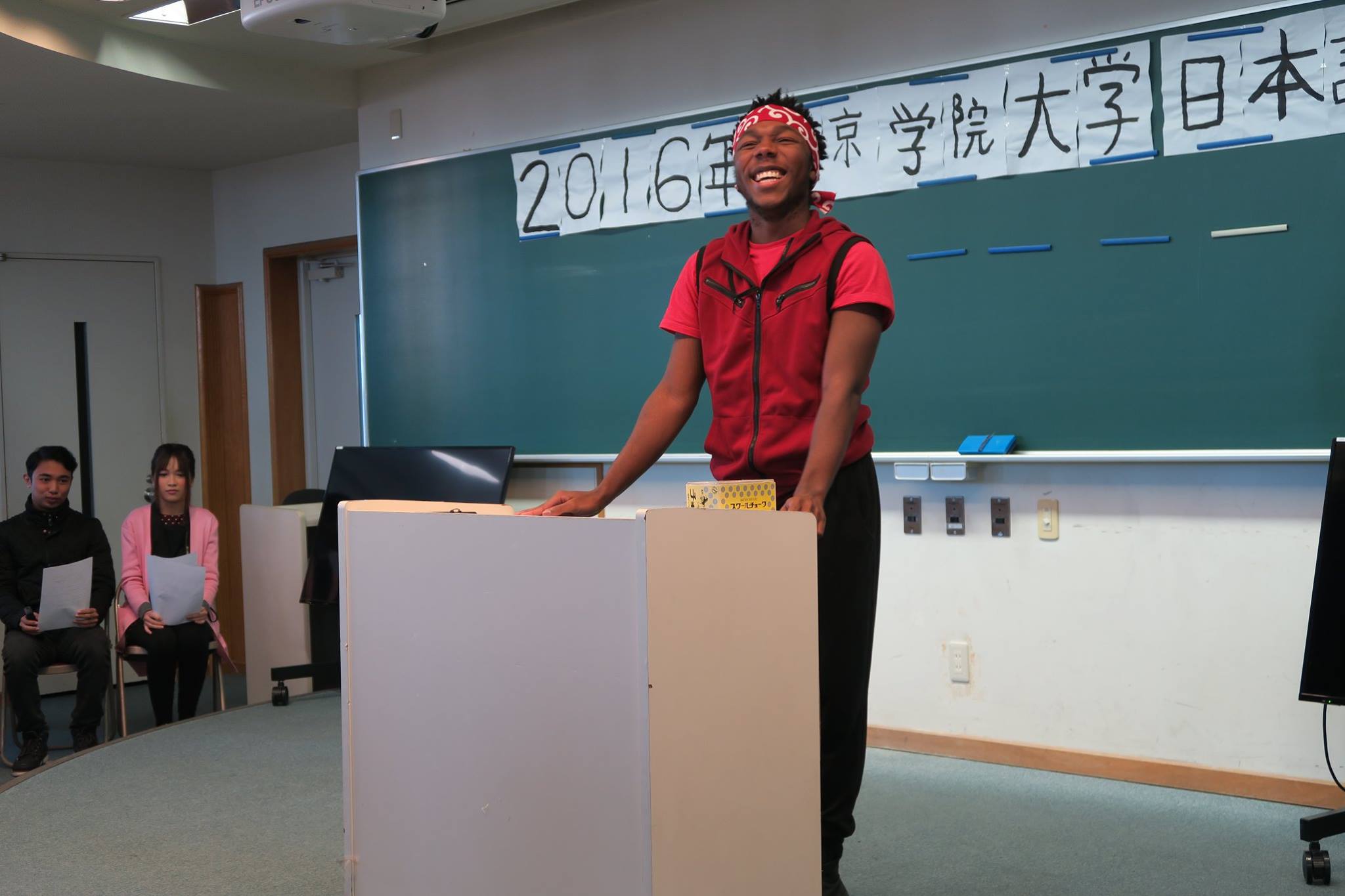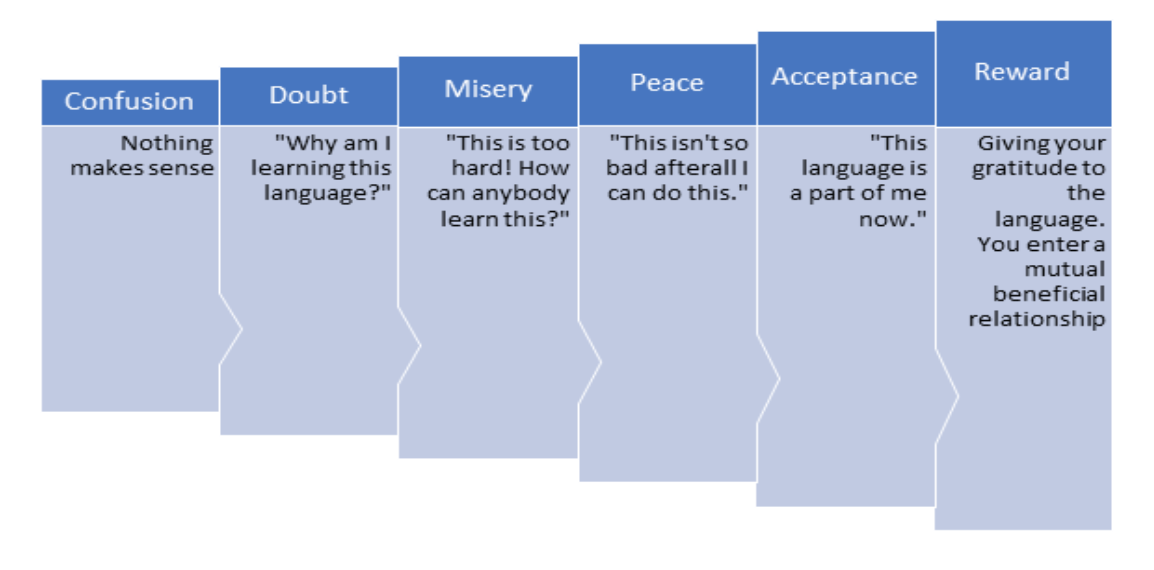Hello! My name is Kiandro Scavella and I am a 21-year-old language enthusiast with the goal of becoming a polyglot. Part of this goal entails me discovering more about travel, culture, and languages respectively. I own a website dedicated to this cause and it took me a while, but I managed to coin-up the term Worldly Words as the domain. I find it all so fascinating when cultures are able to exchange information, and at the forefront of it all is language as a means of communication.

It All Started In High School
There I was drifting away in the back of my Spanish class. I must’ve been in 11 or 12th grade at the time. Back then language had never really stood out to me, in fact, I hated it. I had to know more about why I hated it and if my hatred was being misguided. It turns out that it was … big time. One regular day in Ms.Sanchez’s class I told her that I was studying Japanese instead of Spanish. She didn’t take too kindly to this piece of news. I was almost put out of class for practicing hiragana during a Spanish exam (rightfully so if I may add). The point remains that once I started focusing my efforts on a culture that I was interested in my perspective began to change towards languages.
After graduating from high school, my level of Spanish was “Okay” but it was nothing to brag about. As for Japanese, I put the language in my back pocket, barely having managed to read and write hiragana and katakana. Well, that and the fact that nobody took me seriously when I told them that I was going to learn Japanese and fly to Japan one day. But, here I am as of (September 23rd, 2018) on a plane to Japan to start my graduate program, typing this on a word doc reminiscing on that fact. Anyway, let me tell you guys about college before I get too deep into my feelings.
My College Years
In college, my first major was numerical computation. I was godawful at math, so I don’t know how I managed even to conceive that idea of a major. I soon realized that that specific major wasn’t for me and like every other silly first-year college student I switched majors…several times. Art, music, natural science and then finally Asian Studies. The decision came to me as a last minute effort to register for classes on time during my sophomore year. I remembered my high school years and the personal promises I had made to show everybody up who doubted me. That’s a huge part of language learning, by the way, commitment. Once you say something, you have to mean it, and you have to follow through. By majoring in Asian Studies, this was my opportunity to show them all just how serious I was when I proclaimed my Japanese language learning journey.
The Start Of Language Learning
Always remember this one thing, there will be times when language learning will seem impossible. But, this is nothing to worry about and it’s completely natural to struggle in some areas. For instance, even after four years of studies I still have some room to improve on certain things when it comes to Japanese. There will be times when you question your initial motivation, but as you go along things will clear up. And once you have a balance between input and output everything will work out in the long run. The important thing is that keep your motivation and your purpose. So if sounds don’t make sense to you can you can’t quite read anything just yet, remember this “IT WILL ONLY GET BETTER!”
The Stages Of Grief In Language Learning
There is a term known as the stages of grief, and usually, it can be used to describe the feeling going through harsh times. However, for any language learner, the same applies. When it came to Japanese, there were five specific moments of grief that were experienced.
- Confusion – This is the first stage, and it involves being continuously confused, nonstop, 24/7 around the clock. In my college language classes, the sound of Japanese sounded like static fuzz, in other words, it wasn’t comprehensible everything sounded like nothing.
- Doubt– “Is this language right for me?” We’ve all had that question in the back of our minds. I think I first started experiencing this symptom when I was in my junior year of college and couldn’t read any Kanji
- Misery – At this point, you just become infuriated with the language for no credible reason at all. The very sight of Japanese characters bothered me when I returned from my study abroad program in 2016. Maybe it was because of the constant exposure and the inner-me just felt like he needed a break.
- Peace – The good news is after misery it doesn’t get much worse. Being at peace with a language means that it no longer troubles you. At this stage, I just minded my own business watching Netflix series in Japanese and listening to the j-pop and singing along.
- Acceptance– You’ve realized that this is the language for you. At this point, the language has blended itself into your personality to the point that separation from it would mean a loss of identity. I cannot picture myself without a background in Japanese culture and language. Sure we had our rough moments, but in the end, we became friends, and I’m grateful for that.
- Love/Motivations/Pride/Reward – You begin to reap the rewards of your hard work, and it feels absolutely amazing. From now on there will be no drawbacks, only good things will come from your relationship with your target language. You’ll also have all the bragging rights in the world, but don’t get too crazy!

What I Learned From Studying Japanese
Aim for the stars: If you’re learning a foreign language or thinking of it, I’d say aim for the stars. And I know that sounds corny, but there is no better way to put it. You can’t half-ass any language you take up, it’s either go hard or go home.
Avoid Shortcuts When Learning The Alphabet: If a language has an alphabet that is noticeably different from your own, learn the true form of it. For instance, Japanese has romaji, but you won’t ever see romaji in everyday Japanese – rather hiragana, katakana and kanji. In short, don’t cheat yourself.
Keep Your Input and Output Balanced: Having the perfect amount of input and output will ensure that your language skills are always progressing. speak as often as possible.
Learn the Grammar: I’m not a huge fan of grammar, but if you know where I’m going with this article, then you should know what I’m about to say. You NEED it. Learn to balance your study schedule between intense and soft sessions, give your brain a rest when it feels like mush.





One thought on “My Language Learning Journey – Kiandro Scavella”